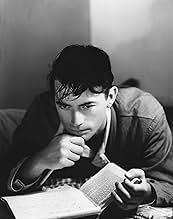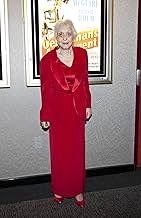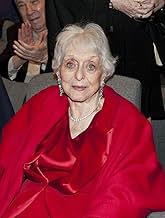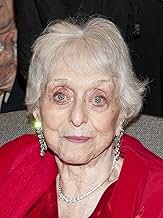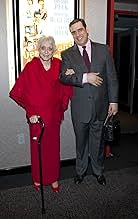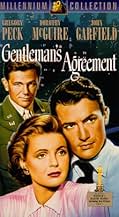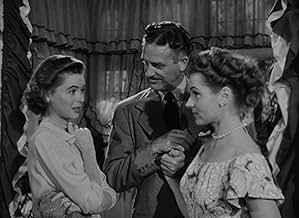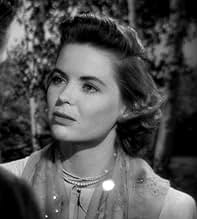Un reportero finge ser judío para cubrir una historia sobre antisemitismo y descubre personalmente lo peor del fanatismo y el odio.Un reportero finge ser judío para cubrir una historia sobre antisemitismo y descubre personalmente lo peor del fanatismo y el odio.Un reportero finge ser judío para cubrir una historia sobre antisemitismo y descubre personalmente lo peor del fanatismo y el odio.
- Dirección
- Guionistas
- Elenco
- Ganó 3 premios Óscar
- 17 premios ganados y 9 nominaciones en total
- Bill Payson
- (as Ransom M. Sherman)
- Waiter
- (sin créditos)
- Nightclub Patron
- (sin créditos)
- Mother
- (sin créditos)
- Dirección
- Guionistas
- Todo el elenco y el equipo
- Producción, taquilla y más en IMDbPro
Opiniones destacadas
Elia Kazan, as I read about him in Wikipedia, has been proclaimed as an 'actor's director' for implementing his Method techniques in his film in a way that brings out the truest emotion within his actors. When Marlon Brando hails him as the best experience he has ever had with a director, it means a lot. And Gentleman's Agreement has a lot to say about the director's way of handling his actors and the subject of the film. The film seems rather like a filmed play, blackouts after every scene, unelaborated production and specific focus on actors. And the actors never sob their eyes out or scream their lungs out; their actions seem controlled and natural. There is scant music during the scenes, and therefore we never are made to feel in a particular way; everyone in the audience is entitled to feel his/her own way. And that's what made me astonished, as I was expecting high-voltage drama with the message bombarded upon the viewers. Although there were some unneeded moments, the impact that the film had on me was much more because all the actors collaborated so well without having any 'Movie Star' moment.
The matter is contentious and provocative – in the 40s; a reporter pretends to be a Jew for an article to directly be able to understand their feelings and presence in the white Christian dominated society. He is supported wholeheartedly by his openhearted mother and precocious son while equivocally by his fiancé. His decision leads to many confrontations, though most are not very serious, and a newfound friendship. The film distinguishes the varying attitudes of people – some take the initiative for the better, some for the worse while most sit on the fence. Here, Gregory, as Schuyler Green has been assigned to cover about anti-Semitism, which at that time was widely prevalent. He remains indecisive for a while but with the support of his family goes ahead and hits upon the idea of going undercover as a Jew. Gregory portrays him with immaculate sincerity though his character could have been written in a cleaner and riskier way. By this I mean his character does not experience to a fuller extent the discriminations among Jews because the radius his character chooses is limited to the upper caste society which remains more discreet in conveying its feelings. Also, there was abundant focus on his relationship with Kathy, his fiancée which although was very interesting as it gave focus to her own views on racism, but it neglected his interactions with other people. Yet, to take up this matter in the 40s is very brave.
Some viewers on IMDb denounce Kathy for being shallow, but I have to say that most people even today are like her in some or the other way. We know that something is wrong yet we sit and do nothing. And Dorothy McGuire channels this feeling of 'shame of not doing something' to a tee. And regarding certain viewers' complaint regarding the ending of the film, I say that basic human feelings such as love should not alter because of one incompatibility. I shall give a personal example here: My grandmother is staunchly against a leader's administration and is quite vocal about it but she would always reprimand my grandfather whenever he would provide criticism about the reader in the newspaper. That does not mean my grandpa will divorce my grandma and go soul searching; I was not disappointed by Schuyler's decision in the end.
The supporting cast act like pillars in the film, with not one misstep from the actors. Celeste Holm is simply amazing as the feisty fashion editor who believes in equality. And I felt she really had her feet on the ground, unlike fireball Bette Davis in All about Eve, whose character too has the similar zest but seems to spit ember and heat up all the scenes. Celeste is fun, over-the-top and believable, she also wonderfully acts especially in her final scene. Anne Revere is equally brilliant, and John Garfield and June Havoc give their best in their short roles. Garfield surprisingly didn't receive supporting actor nomination, since he has some climatic scenes and dialogs. And what conviction does the young Dean Stockwell display!
The ensemble is one of the best I have seen, and under Elia's guidance, deliver their best and most genuine. It may get dreary for those expecting swelling music and over-the-top moments but anyone who can notice the director's courage for making this shall be greatly impressed.
My Rating: 9 out of 10
Anyway now to the plot. Phillip Green (Gregory Peck) is a writer who pretends to be Jewish to find out about anti-Semitism. Through this, he learns how much people discriminate against Jews and it affects him deeply and changes his life.
I was never bored in this film. I am forever fascinated by Peck, who I've always remembered as Atticus Finch in To Kill a Mockingbird (1962). This is only the second film I've seen with Peck in his younger days (it's quite a pleasure watching him). Celeste Holm also is amazing and I love how she can laugh so easily very realistic. The only thing I wasn't satisfied with is the romantic choices by Peck's character. I wish he would have chosen the happy blonde Anne instead of the sappy, boring Kathy. Oh, how I was hoping he would choose Anne! Perhaps Dorothy McGuire was miscast; maybe someone else could have brought more energy to her character. John Garfield is fantastic as Green's Jewish friend.
This was ground breaking at the time and I really respect the people who participated in this film for taking a risk. Despite being made almost 60 years ago, I have not only learned from it but enjoyed it. Yes, there are some inaccuracies and plot holes, but I don't particularly care and it doesn't distract me. It's a great film, go see it.
I recommend this film, but it won't be for everyone and many of us would rather just pass this one by. But we shouldn't even though it holds up this mirror making us feel guilty and uncomfortable. I should point out that the ending relating to the love interest in the story just doesn't work, but then that is not the purpose of the film. Prejudice, anti-Semitism and discrimination are, and these elements are worked out well. A disturbing but intelligent portrayal which is worth taking in for what it is worth.
An interesting and rabid attractive drama in which a reporter pretends to be a Jewish in order to cover a story on anti-Semitism , only to find the masquerade entailing a backlash of grief and pressure for himself and his own family . Archetypical Hollywood social comment and the 20th Century Fox studio's fondness for realism looks remarkable dated in places . However , relying heavily for complicated loving relationships , tension and on a handful of attractive dramatic pieces and offering an important analysis of the problem . This sentimental and muddled film was Hollywood's first major attack on anti-Semitism. A successful movie that received 8 Oscar nominations and three wins, including Kazan's first for Best Director. Gregory Peck gives a terrific acting in an upright role similar to Atticus Finch , he is a journalist who has to deal with both overt and covert prejudice . John Garfield has a small but essential role as Phil's Jewish friend Dave . Starring Gregory Peck and Dorothy McGuire are accompanied by a very good support cast , such as : Celeste Holm , Anne Revere , June Havoc , Albert Dekker , Jane Wyatt , Dean Stockwell and Sam Jaffe.
The film was compellingly made by Elia Kazan who did not get along with actor Gregory Peck ; as usual Kazan dealing with thoughful and provoking issues . In fact , his films were concerned with personal or social issues of special concern to him. Kazan writes, "I don't move unless I have some empathy with the basic theme." And this first such "issue" film was Gentleman's agreement (1947). It was followed by Pinky (1949), one of the first films in mainstream Hollywood to address racial prejudice against black people. A streetcar named Desire (1951), an adaptation of the stage play which he had also directed, received 12 Oscar nominations, winning four, and was Marlon Brando's breakthrough role. In 1954, he directed On the waterfront (1954), a film about union corruption on the New York harbor waterfront. In 1955, he directed John Steinbeck's East of Eden (1955), which introduced James Dean to movie audiences. Rating : 6.5/10 .Notable . Controversial in its day , yet still timely .
Oscars Best Picture Winners, Ranked
Oscars Best Picture Winners, Ranked
¿Sabías que…?
- TriviaIn 1984 Gregory Peck claimed to have been misquoted in a 1967 interview in which he said Elia Kazan was the wrong director for the film. The actor said, "That's a misunderstanding. I don't think there could have been a better director for the film. What I meant was that he and I didn't have a rapport; emotionally, we were not on the same wave length. I don't think that I did my best work for him. If I worked with him now--as a mature man--I think I would give him everything he would want."
- ErroresEarly on, when Phil reminisces about his Jewish friend, Dave, he looks into the mirror and assesses his own features as being consistent with those of the Jews. This reveals his own experiences of having been influenced by the false stereotype of there being a "Jewish look". This is antithetical to his attacking anti-Semitic thoughts and actions in others, throughout the film. This, however, should not be considered a "GOOF" as many people are guilty of hypocrisy.
- Citas
Kathy Lacey: You think I'm an anti-Semite.
Phil Green: No, I don't. But I've come to see lots of nice people who hate it and deplore it and protest their own innocence, then help it along and wonder why it grows. People who would never beat up a Jew. People who think anti-Semitism is far away in some dark place with low-class morons. That's the biggest discovery I've made. The good people. The nice people.
- Créditos curiososThe main title theme begins with the Fox logo, replacing the usual Alfred Newman fanfare.
- ConexionesFeatured in Precious Images (1986)
Selecciones populares
- How long is Gentleman's Agreement?Con tecnología de Alexa
Detalles
Taquilla
- Presupuesto
- USD 1,985,000 (estimado)
- Tiempo de ejecución1 hora 58 minutos
- Color
- Relación de aspecto
- 1.37 : 1
Contribuir a esta página



